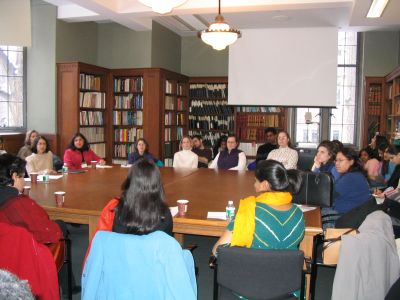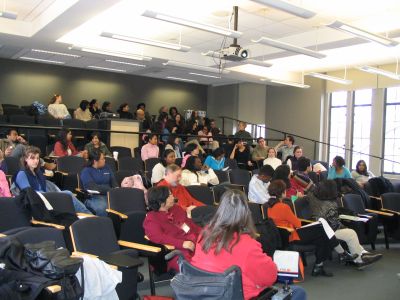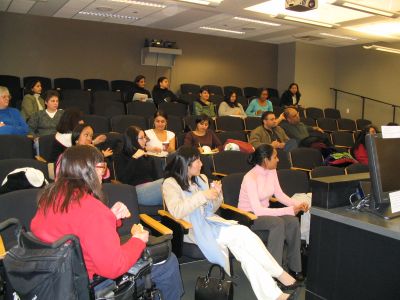Contribute
| Saheli's Conference On South Asian Families And Relationships |
Gouri Banerjee
02/20/2005
Stepping out of its usual role of addressing domestic violence, Saheli, the premier South Asian women’s group in Boston, organized an innovative conference focused on South Asian families and relationships. The conference was sponsored by Wellesley College’s Association for South Asian Cultures. It’s purpose was to address emerging topics in the community that are rarely discussed such as dating, support and legal systems for women facing violence, same sex relationships, and the relevance of arranged marriages. The keynote speaker, Anita Raj, Ph. D. of BU School of Public Health, spoke about intimate partner violence among South Asians. Her research in the Boston community showed that abuse by intimate partners is very high; most women either experienced violence themselves or knew someone well who did. Dr. Raj noted that young people face increasing violence in dating relationships, and are vulnerable when they are in same sex relationships. Shilpa Dave, of Brandeis University led a panel on dating, cultural conflict and intimate violence. With clips from popular media she showed the dating dilemma of South Asians girls. There are many contradictory messages—assertiveness, power and status of males, femininity, girls seen as moms and aunties, not as equal partners, daughters unable to talk to parents about dating. South Asian parents have very high standards about whom daughters should date. For example, a South Indian Brahmin, engineer or doctor, with high family status is very desirable. Sriram Ananthanaryanan, on the same panel, questioned what is considered beautiful among South Asians. Newspaper ads for brides in a male dominated culture provide visual and sexual pleasure by suggesting girls should be slim, beautiful and professional. Coming from Bangalore, Sriram observed that archaic cultural values have a “vice-like” grip on the South Asian mind, even those values that are obsolete. Kathie Malley-Morrison of BU, discussed international perspectives on family violence and talked about the punishment mentality in America as compared to the Swedish campaign against spanking. She noted that in America aggression is seen as being associated with masculinity. Tanvi Shaveri, a graduate student, presented her research findings on college student’s experiences and judgments of dating violence and aggression. The conference panel on same sex relationships included members from the Massachusetts Area South Asian Lambda Association. Nikhil Aziz, came out to his family only after his younger sister was married, yet his family continues to keep his gayness secret. Elizabeth Abraham’s family accepts her decisions, but the extended family has been hostile. Sridhar Vajapeyam knew he was gay when he was a teenager but it was not until he came to the US as a graduate student that he could admit it and come out. His mother continues to raise the subject of him marrying a ‘nice Indian girl.’ Aida Khan, grew up in the Philippines and Pakistan, was cut off by her mother for her gayness, but her father has come to terms with her choices. Aida has raised a daughter together with her female partner. Sarav Chithambaram said that in India to admit you are gay is like saying you are crazy, deviant or made to feel very guilty. He said coming to America was like becoming free; still his family continues to be unsupportive. The ancient Indian institution of arranged marriages was discussed by panelists Drs. Kum Kum Mallick and Harleen Singh. They traced the history of this ancient institution and suggested how it has changed to accommodate relationships in a fast moving culture where both men and women are seen equals. They discussed the stresses on arranged marriages and why the system breaks down. The conference also had a panel on the support and legal systems available for South Asian survivors of domestic abuse and violence. Shelter, legal, medical and other support systems were discussed. Attorneys Neha Lall, Manisha Bhatt and Djuna Perkins, discussed how sexual assault, domestic violence and abuse are viewed in criminal and civil courts and how the court systems in Massachusetts treat offenders. Roshan Bhandary from the Asian Task Force Against Domestic Violence shared information about the typical South Asian woman seeking services at the shelter. As an affiliate of the India Association of Greater Boston, Saheli has helped women to gain economic independence, assisted with legal and immigration issues, and supported many women in situations of domestic violence. It has built up an impressive list of achievements in the area of English language, computer literacy, citizenship classes in addition to its work with domestic violence and abuse. To volunteer or find more details see the Saheli website www.saheliboston.org. For more information contact hewetts@verizon.net or ritashah@mail.com.
You may also access this article through our web-site http://www.lokvani.com/


